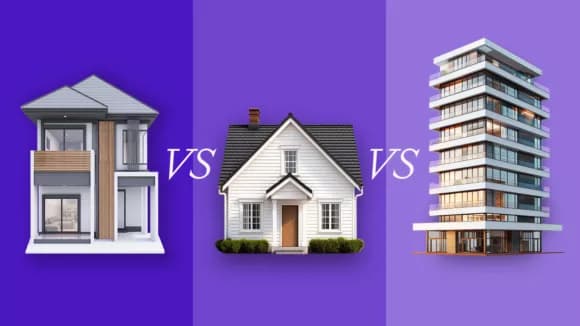
Property Types
What is a cross lease? Pros and cons
Learn what a cross-lease property is, and what you need to know before buying or selling one – to ensure you don’t trip on commonly found issues.
Property Types
5 min read

Author: Ed McKnight
Resident Economist, with a GradDipEcon and over five years at Opes Partners, is a trusted contributor to NZ Property Investor, Informed Investor, Stuff, Business Desk, and OneRoof.
Reviewed by: Andrew Nicol
Managing Director, 20+ Years' Experience Investing In Property, Author & Host
Houses tend to grow in value slightly faster than townhouses, but by a very slight margin. Apartments go up in value much slower than houses and townhouses.
After hosting the Property Academy Podcast for 5 years, one of the most common questions I get is: “Ed, be honest, what goes up in value faster – a house, a townhouse or an apartment?”
Here at Opes Partners, we recommend a lot of townhouses to investors. We also help investors buy houses and apartments, but we do focus on townhouses.
That does mean I’ve got an incentive to be biased and tell you that townhouses go up in value the fastest. I’m not going to do that.
That’s why I went to the Real Estate Institute of New Zealand. I wanted to get the best data to answer this question in an honest and unbiased way.
My approach is simple. I’ll lay out what the data says so you can decide which is the right investment for you.
Let’s start with apartments vs townhouses and houses in Auckland City.
The dark blue line shows the average annual capital growth of townhouses and houses (averaged over the prior 7 years). The light blue line shows the same data for apartments.
This shows the long-term capital growth rate between the two types of properties.
Straight off the bat, we can see apartments achieved significantly less capital growth over the long term.
The key takeout is townhouses and houses had higher capital growth 91.5% of the time.
And, on average, townhouses and houses increase in value 2.82% faster per year.
In Wellington, it’s the same. Apartments don’t increase in value as quickly, despite the high number of apartments in the city.
Sure, in the very early days of the 2000s, the growth rates for apartments were higher than for houses or townhouses.
But that trend didn’t last.
The value of townhouses and houses increased faster 85% of the time. On average they increase in value 2.32% faster per year.
In property investment circles, many people think townhouses sit in second place behind houses when it comes to capital growth. But do they? Let’s take a look at the data for our three larger cities:
In Auckland, there is some difference between houses and townhouses, but the difference isn’t that much.
Houses had a higher long-term capital growth rate 89% of the time but only with a 0.62% margin.
That means if houses received a capital growth rate of 7%, townhouses grew by 6.4% in that given year.
In Wellington City it’s a slightly different story. Houses only beat townhouses 56% of the time. On average, houses only beat townhouses by 0.14% per year.
This means that if a house increased by 5% in a year, the equivalent townhouse increased 4.9%.
Christchurch is in between Wellington and Auckland on these figures.
On average now, houses beat townhouses 73% of the time, but only by a 0.6% margin.
A note on the data: This set used the median sales data. This is a lesser quality data set, but the best we have.
I wasn’t able to use the REINZ House Price Index (the highest quality data).
Don’t lose heart, it’s still good but means we need to look for big slam-dunk trends to have confidence in the conclusions. If we see an undeniable trend, that’s when we can have confidence in the findings.
Let’s dig into the pros and cons of houses, townhouses and apartments when it comes to investments.
Standalone houses are often popular with investors. All things being equal, they tend to go up in value the fastest and are also the most familiar.
But, they also tend to be further out of the city and are more expensive. That means not every investor can afford one.
When it comes to townhouses, they tend to get better rental yields. Because they’re cheaper, you can often buy one that’s closer to the inner-city. Tenants love being closer to work.
But they can have smaller gardens and land, which not everyone likes.
Apartments are often the cheapest option. They achieve higher rental yields, but they also go up in value the slowest.
The decision about what you should invest in is not always cut and dried.
Ultimately, you’ll need to look at the data, the properties and the numbers and make a decision. That’s where investing gets fun.
Resident Economist, with a GradDipEcon and over five years at Opes Partners, is a trusted contributor to NZ Property Investor, Informed Investor, Stuff, Business Desk, and OneRoof.
Ed, our Resident Economist, is equipped with a GradDipEcon, a GradCertStratMgmt, BMus, and over five years of experience as Opes Partners' economist. His expertise in economics has led him to contribute articles to reputable publications like NZ Property Investor, Informed Investor, OneRoof, Stuff, and Business Desk. You might have also seen him share his insights on television programs such as The Project and Breakfast.
This article is for your general information. It’s not financial advice. See here for details about our Financial Advice Provider Disclosure. So Opes isn’t telling you what to do with your own money.
We’ve made every effort to make sure the information is accurate. But we occasionally get the odd fact wrong. Make sure you do your own research or talk to a financial adviser before making any investment decisions.
You might like to use us or another financial adviser